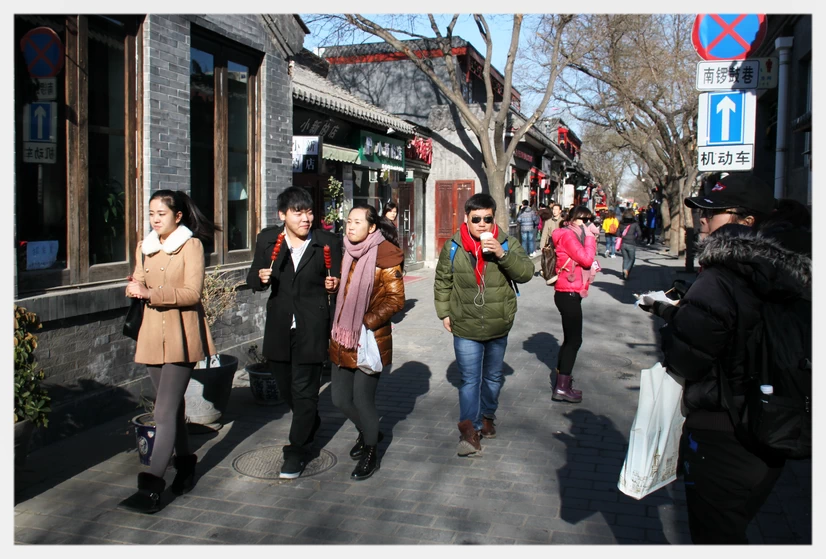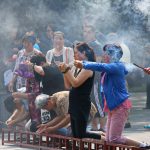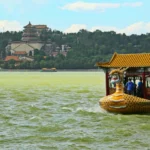Nanluoguxiang, also known as South Luogu Lane, or Nanluogu Lane, is a historic hutong (narrow alley) located in the Dongcheng District of Beijing. It is one of the most popular tourist destinations in the city and offers a glimpse into traditional Beijing life.
Why South Luogu Lane?
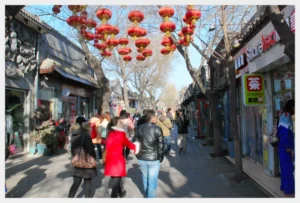
History: South Luogu Lane dates back to the Yuan Dynasty (1271-1368) and has a history of over 740 years. It was initially built as a residential area for imperial officials during the Yuan Dynasty and later became a vibrant commercial district.
Hutong Architecture: South Luogu Lane features well-preserved traditional hutong architecture, characterized by narrow alleyways, traditional courtyard homes (siheyuan), and grey-tiled roofs. It provides a charming and nostalgic atmosphere that contrasts with the modern developments in the city.
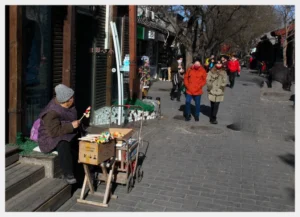
Small Shops and Cafes: The lane is lined with numerous small local shops, boutiques, souvenir stores, and cafes. Visitors can find a variety of traditional handicrafts, clothing, accessories, and unique trinkets. It’s a great place to shop for souvenirs and experience the local flavor.
Food and Drinks: South Luogu Lane is renowned for its diverse culinary scene. There are numerous restaurants, street food stalls, and teahouses offering a wide range of Chinese and international cuisines. Visitors can try Beijing specialties, such as fried Beijing yogurt, jianbing (a savory pancake), and various types of noodles.
The layout of Nanluoguxiang
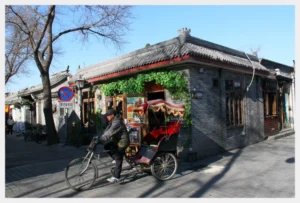
Main Alley: The central part of Nanluoguxiang is a long, straight alleyway that stretches for about 800 meters from south to north. This main alley is pedestrian-only, allowing visitors to explore the area comfortably on foot.
Side Alleys and Cross Streets: Nanluoguxiang is neatly intersected by totally 16 side alleys and cross streets in a fishbone shape. Overlooking the entire street, they resemble a centipede, Nanluoguixang is also called Centipede Street.
These smaller alleyways add to the charm and offer more opportunities to explore shops, cafes, and hidden courtyards.
Siheyuan Courtyards: Nanluoguxiang features traditional Chinese siheyuan courtyards on both sides of the alley. Siheyuan is a traditional Beijing architectural style characterized by a square or rectangular layout with buildings surrounding a central courtyard. Many of these siheyuan have been renovated and repurposed into shops, restaurants, and cafes.
How to get to Nanluogu Lane?
Identify the Nearest Transport Option: Nanluoguxiang is located in the Dongcheng District of Beijing. The nearest transport options include subway, bus, or taxi services.
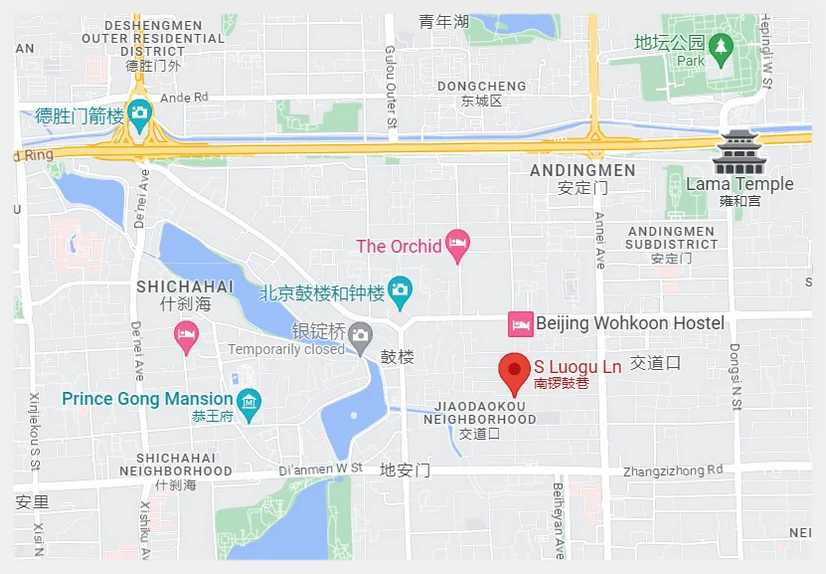
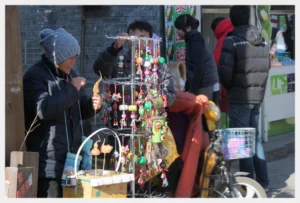
Subway: Take Line 6 and get off at Nanluoguxiang Station (Exit A or B).
Follow the signs or ask locals for directions to Nanluoguxiang.
Buses: Many buses pass through Nanluoguxiang. Look for bus stops near your location, and board a bus that passes by Nanluoguxiang. Get off at the Nanluoguxiang bus stop.
Take the Bus 3, 4, 13, 42, 60, 118, 612, Sightseeing Bus 3, get off at Nanluoguxiang station;
Take bus No. 82, 107, 124, 135 and get off at Baochao Hutong Station.
Taxi: Inform the taxi driver of your destination, “Nanluoguxiang” or “南锣鼓巷” in Chinese. It’s advisable to have the address written down or saved on your phone.
Taxis are readily available throughout Beijing, and using a ride-hailing app like Didi can be convenient.
Explore Nanluoguxiang
Once you arrive at Nanluoguxiang, you can start exploring the area on foot.
The main alleyway of Nanluoguxiang is pedestrian-only, so it’s a great place to walk around, explore the shops, eateries, and traditional courtyard houses.
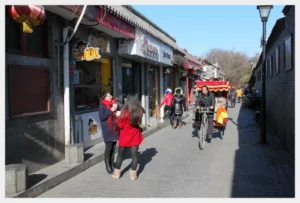
South Luogu Lane can get crowded, especially on weekends and holidays. To make the most of your visit, consider going during the early morning or weekdays to avoid the peak tourist times. This will allow you to fully immerse yourself in the experience without dealing with large crowds.
Enjoy the atmosphere, try local snacks, and visit the unique stores and boutiques along the lane. Nanluoguxiang is famous for its unique shops, selling everything from traditional Chinese crafts to contemporary fashion. It’s also a hub for diverse dining options, including Chinese, Western, and fusion cuisines.
You’ll find street art, murals, and cultural events throughout the alley, making it a popular spot for both tourists and locals interested in art and creativity.
Nanluoguxiang is famous for its unique shops, selling everything from traditional Chinese crafts to contemporary fashion. It’s also a hub for diverse dining options, including Chinese, Western, and fusion cuisines.
Nearby Attractions
Nanluoguxiang is a vibrant area with attractions nearby. Consider visiting the Drum and Bell Tower of Beijing, Shichahai Lake area (Houhai Bar Street), Lama Temple, which are within walking distance.
Remember to plan your visit according to your preferences, and consider going during weekdays or non-peak hours to avoid overcrowding. It’s always a good idea to have a map or navigation app on hand in case you need assistance while exploring the area.
More Beijing Travel Guides
Planning your Beijing tour? Our “Beijing Travel Guide“ section offers essential advice to help you navigate the city like a pro. From transportation tips and local customs to insider recommendations for hidden gems, these travel tips will ensure you have a smooth, enjoyable, and unforgettable experience in China’s vibrant capital. Let us guide you through the best practices for exploring Beijing with confidence!

